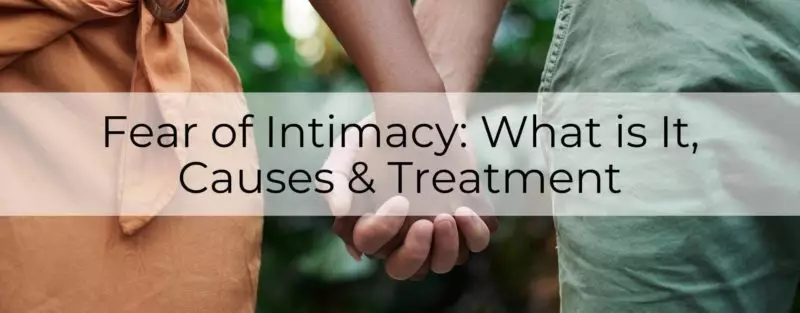
Intimacy [1] is both a sought-after and dreaded phenomenon. Difficult childhood experiences, trauma, and failed adult relationships have reinforced many people’s fears that intimacy is elusive or always painful and disappointing.
Fear of intimacy [2] is defined as “an individual’s reduced capacity to express thoughts and feelings of personal significance with another highly valued individual due to anxiety.” This anxiety phenomenon likely starts at childhood and currently effects approximately 2.5% of the population.[3]
Types of intimacy
Intellectual intimacy, spiritual intimacy, sexual intimacy, physical intimacy, and other forms of intimacy are all widely used to characterize closeness.
The following are some common types of intimacy and their definitions [4]:

What is fear of intimacy?
Fear of intimacy is a common fear of closeness that may harm personal relationships.[5] The findings of a 2021 study support the idea that fear of intimacy can be a significant barrier to romantic relationship pleasure. [6] It may account for low relationship satisfaction associated with alexithymia (together with a likelihood of developing depression or other negative moods).
People who have been through a tough relationship, sexual abuse, or grief, for example, may struggle greatly with intimacy issues and the ability to trust their own instincts as well as another person.
Childhood and early family ties can sometimes play a role, especially when there has been trauma, neglect, or abuse in the past. [7]
Identifying your own unique cause can be an excellent place to start when learning how to deal with it.

How does intimacy fear affect us?
We don’t deliberately reject love to maintain a familiar identity. Instead, we react with behaviors that generate stress in the relationship and push our loved ones away from closeness and intimacy.
Here are some of the most common ways (symptoms) people emotionally distance themselves as a result of a fear of intimacy [8]:
- Do not show affection
- Indifferent or hostile reactions to affection or favorable appreciation
- Developing a paranoid or distrustful attitude toward a relationship
- Low sex drive
- Excessively critiquing a relationship
- Feeling guarded or apprehensive about being close to someone
How to overcome fear of intimacy
Here are some tips to help you overcome your fear of intimacy: [9]
-
Be open to your partner’s observations and worries to start overcoming your fear of intimacy issues. Be willing to talk about what’s creating your fear of closeness openly and honestly. If your anxiety of intimacy issues worsens, speak to a health professional and seek treatment.
-
Consider why you’re feeling this way. Putting a name to your emotions might assist you in processing your memories and experiences. When did your aversion to intimacy start? Can you recall the first moment you recognized you had a problem with intimacy?
-
Be courageous. It requires courage to open yourself up to others, expose your actual self, and allow yourself to be vulnerable. Learning to overcome your fear of intimacy requires taking a leap of faith and hoping that someone will catch you. Don’t let your apprehension of intimacy keep you from taking that risk.
-
To overcome your fear of intimacy, try cognitive behavioral therapy with a certified psychologist or a certified intimacy coach. You might be able to silence your inner critic and gradually overcome your fear of closeness with loved ones if you learn to rework and reframe unpleasant thoughts.
-
A vicious circle of tension and fear of closeness exists. You might avoid intimacy the more tense and anxious you are. You’ll likely feel more agitated and anxious the more you avoid intimacy. This kind of action only serves to exacerbate the development of intimacy anxiety. To ease stress and irritation, try yoga or meditation. If that’s not your thing, simply making time for something you enjoy every day should.
-
Consider your past experiences. The first step toward overcoming your fear of intimacy is to figure out where it came from (and how it manifests in your current life).
-
Appreciate your partner’s passion and commitment to helping you conquer your fear of intimacy if they’ve indicated that they’re willing to stick with you while you work through your worries.
-
Make minor adjustments. As you strive to conquer your fear of intimacy, practice being vulnerable. Introduce yourself to new people and gently push your emotional boundaries. You’ll be able to progress to taking more enormous risks and making more considerable adjustments as time goes on. You’ll eventually realize that there are advantages to closeness and revealing your true self to the world rather than hiding behind a mask of fear and deep intimacy concerns.

Takeaway
Patience is essential when coping with a fear of intimacy (in yourself or your spouse). Years of deep-seated fears that lead to fear of relationship take time to overcome. You may overcome your concerns and develop strong, healthy, long-lasting relationships with time and the help of a medical practitioner.








